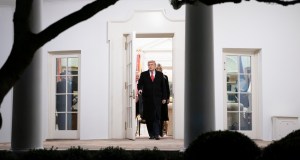White House proposes rule to ban Chinese, Russian parts for networked vehicles

The Department of Commerce took another step Monday in its push to scrutinize supply chains by proposing a ban on Chinese and Russian components deemed a national security threat from connected and automated vehicles.
The White House and Commerce Department are looking for comments on a rule that would prohibit the sale or importation of vehicles outfitted with many of the cameras and sensors that are common today.
Specifically, the ban would apply to the parts needed for “vehicle connectivity systems” — like Bluetooth, cellular service, or Wi-Fi — and comes amid growing concerns that digital conveniences have also created a highly connected playground rife with mass surveillance and malicious hacking.
Many vehicles on the road are considered computers on wheels more than mechanical hunks of steel, and the automobile industry is as much software as a transportation sector. Additionally, rising tensions with China after years of subsidized industrial manufacturing that dominated certain American markets has put national security circles in Washington on high alert.
“The Biden-Harris Administration is focused on comprehensively addressing the threats caused by foreign automobiles and supply chains. In May of this year, President Biden directed an increase from 25% to 100% on the tariff rate on Chinese electric vehicles under Section 301,” the White House said in a statement.
The White House has shown increasing attention on electric vehicles, as many Chinese components or EVs made in China are considered higher quality compared to Western counterparts — though tariffs have staved off widespread adoption of Chinese EVs in the U.S. In May, the administration drastically increased tariffs on electric vehicles from China.
The proposed ban would restrict software from vehicles from the model year 2027 and hardware from the model year 2030. The model year can often be different from the year of release.
The Commerce Department first announced an investigation and a call for comments around the national security risks associated with connected cars in February. At the time, officials noted that there was no plan to probe existing technologies within the U.S. that could be exploited by China.
Comments are due within 30 days of the rule’s posting in the Federal Register.






